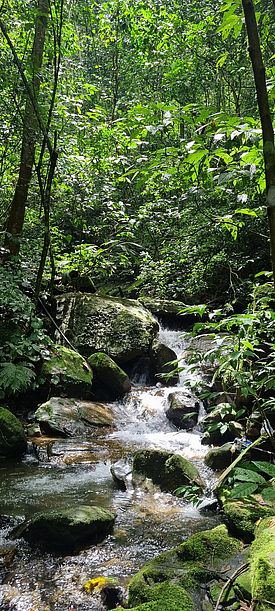Workshop: Infrastructure and standards for Swiss-wide environmental DNA analyses
Début:
Fin:
8 décembre 2023, 15:00
Lieu:
Spiez
Organisé par:
WSL
Modérateur/modératrice:
Loïc Pellissier (WSL, ETH), Aline Frossard (WSL), Florian Altermatt (Eawag, UZH)
Langue(s):
Deutsch, Français, English
Type de manifestation:
Congrès et conférences
Public cible:
Researchers, cantonal and federal environmental agencies, NGOs
The WSL Biodiversity Center is pleased to announce the forthcoming workshop “Infrastructure and standards for Swiss-wide environmental DNA analyses” that will take place on 7 and 8 December in Spiez. The goals of this workshop are to present an overview of eDNA tools that are ready for use and available to practitioners, and to write a white paper on best practices and recommendations for eDNA monitoring for use in Switzerland.
Program in German: available here
Program in French: available here
The workshop is organized by the Ecosystems and Landscape Evolution Group (ETH Zurich & WSL), the Rhizosphere Processes group (WSL), the Altermatt lab (UZH & Eawag), and the WSL Biodiversity Center (WSL). In addition to WSL and Eawag researchers, participants include representatives from government offices, NGOs, and other research institutions who work with eDNA monitoring or are involved in established monitoring programs.

Environmental DNA (eDNA) is becoming a more and more popular tool for biodiversity monitoring in soil, terrestrial, and freshwater ecosystems. In Switzerland, both cantonal and federal agencies rely on eDNA service providers to monitor invasive species and evaluate restoration projects. While eDNA is often described as a rapidly evolving field due to improvements in sampling processing costs and sequencing technologies, some methods are well-established enough to be applied by practitioners. There is a need to use standards when applying these methods for quality assurance given the increasing number of eDNA service providers and projects as well as to ensure the repository of samples and data toward future use.
In this workshop, we aim:
- to work together with cantonal and federal agencies to assess their needs in terms of eDNA monitoring;
- to inform cantonal and federal agencies on the state of the science, maturity, and best practices for eDNA monitoring, focusing on tools that are ready to be used by practitioners;
- to brainstorm the potential application for complementary monitoring programs;
- to inform on the future accompanying role and services of Eawag and WSL; and
- to write the outline of a white paper on eDNA best practices guidelines for government agencies.
The content of the white paper (aim 5) will be determined by the needs of the cantonal and federal agencies (aim 1) as well as the discussions held during the workshop (aims 2-4). Some potential topics that we anticipate including are sample sizes and study design, the quality of eDNA samples, and the variations in technique requirements depending on the type of organism. After the workshop, researchers from WSL and Eawag will continue to work on the white paper, with the goal of publishing it in 2024.
The workshop will take place in Spiez (hotel Seaside). The first day will focus on presentations on eDNA tools and group discussions on the needs of government offices. The second day will be dedicated to synthesize the results of the first day and to write the outline of a white paper on best practices. You can find the program here.
Participants are encouraged to stay for the duration of the workshop, but it is also possible to attend only specific days.
For more information, please contact:

